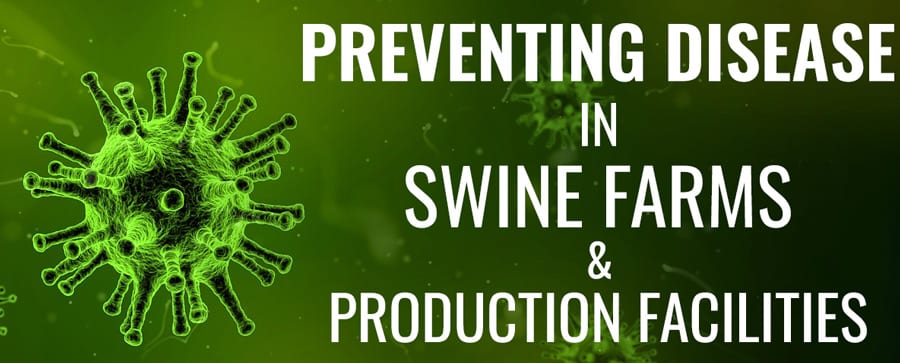A swine disease prevention strategy should be a common practice for all hog farmers. To have a successful farm, keeping animals healthy is a must. A health plan for your herd will help to minimize disease incidence. Pig-specific diseases can have major repercussions for the herd, the farm, and people themselves. The introduction of viruses and bacteria into a pig farm can be devastating on many levels. Among factors like maintaining the right temperature for pigs, diseases not only threaten the animal’s health and well-being, but the sustainability of the herd.
Fortunately, significant advances in disease prevention strategies have been made over the years to ensure sustainable pig farming practices. Chief among these is an important management tool commonly referred to as biosecurity.
Biosecurity a set of prevention measures designed to stop the introduction or spread of disease into a pig farm. It is a combination of:
- Good herd management practices
- Careful observation
- Quarantining
- Healthy pig feed
- Maintaining health and hygiene
- Providing a clean environment for the animals
Herd Management & Observation
Several steps can be taken to maintain the health of pigs in a swine operation. For starters, acquisition of new stock should be purchased from reputable, certified sources. Healthy stock is the best way to prevent having to deal with swine disease. Observation is key not only new stock, but the entire herd. Walk the pens daily to observe any sign of ill health, unusual behavior, or potentially sick pigs.
Quarantine
The next step is quarantine. Never introduce new stock into a herd directly. Farms should have barns available to keep new pigs separated from the rest of the herd for a minimum of 30 days. This should also be done when pigs return from fairs, shows, or exhibitions.
Make sure the herd is tested for specific diseases prior to their addition or return to the farm, and also for parasite control. There are a variety of compounds for the latter and vaccinations for the former. Parasite control and vaccinations constitute a major part in the control of the disease. The best times to administer compounds and vaccinations are prior to breeding and before farrowing.
Feed Quality & Freshness
Fresh feed is also an important step in keeping the herd healthy. Osborne offers high-quality indoor and outdoor hog feeders for producers that will help to keep your feed fresh. The Big Wheel® round feeders are available for nurseries, finishing, wean-to-finish, outdoor/bulk, and ad-lib sow feeding. Rectangular feeders can service the nursery, finishing and wean-to-finish, with many options to customize. The Osborne Pivot Feeder™ is an economical option for ad-lib lactation feeding.
Healthy Environment
The final step in biosecurity, and the most important in disease control, is to ensure environmental measures are in place in the facilities. Sanitation and proper ventilation of buildings will help prevent disease. Keeping a clean farm is essential for a profitable operation. Barns and equipment should be thoroughly disinfected because a clean environment means healthier pigs.
Along with cleaning, a well-ventilated farm building makes for a healthy, productive environment for your livestock. Optimum ventilation expels condensation and foul odors from buildings. Osborne’s barn ventilation systems that include products like the Auto-MAX® series of ceiling, wall, and hallway inlets, draw fresh air into barns, hallways, lofts and attics to keep indoor environments clean and healthy.
Establishing and implementing a biosecurity plan can lower the risk of pathogens being introduced or spread on a pig farm. Healthy pigs produce safe pork. Prevention is far more profitable than treatment!





